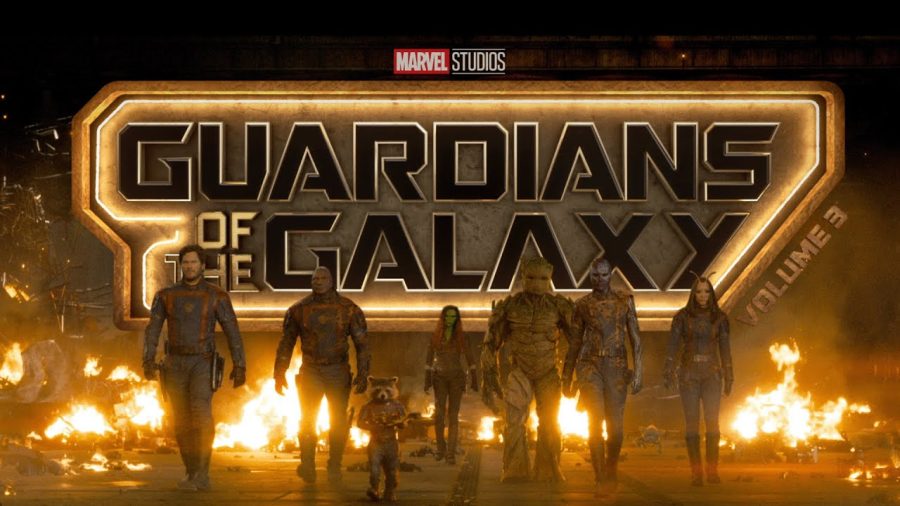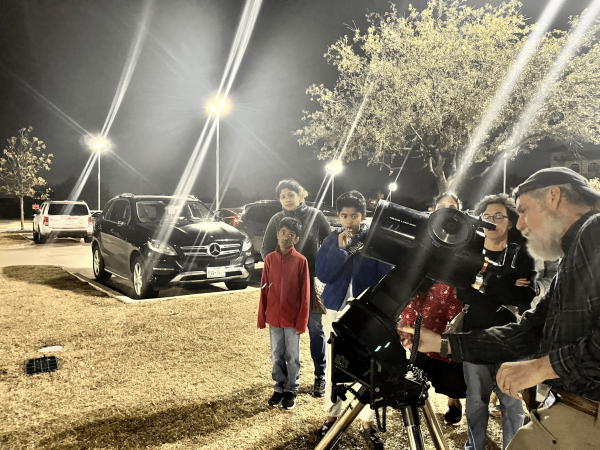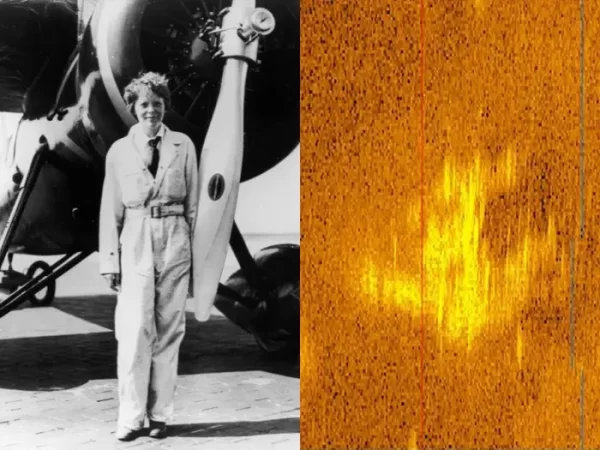Review: “Guardians of the Galaxy Vol.3”
Nine years ago, Marvel Studios’ “Guardians of the Galaxy” arrived in theaters, and adapted a ragtag group of unknown comic book characters on the big screen.
Today, they are known as household names, and their Marvel Cinematic Universe (MCU) journey has continued with “Guardians of the Galaxy Vol.3” hitting theaters last weekend.
In the midst of an era where comic book movies falter more often than not, it miraculously manages to balance humor and heartbreak with a masterfully written screenplay and inspired directorial decisions. I personally view it as one of Marvel’s best films.
The vast majority of its success comes from James Gunn, who wrote, directed, and produced all three installments in the “Guardians of the Galaxy” trilogy.
His style is prominent throughout the film. From the vivid cinematography to his signature brand of humor and music, the film was able to create beautiful visuals, crowd-pleasing comedy, and intense ‘needle-drop’ moments.

One action sequence taking place in a hallway perfectly exemplifies how effective Gunn’s directorial talents are. It is perfectly choreographed with an awesome soundtrack that plays as the camera weaves in and around the hallway, with a wide-angle lens showing all of the action taking place simultaneously in the foreground and background of the scene. The shot effortlessly transitions in and out of slow motion to highlight the scene’s most epic and victorious moments, and the whole scene is done in a single remarkably memorable minute-long take. It is the MCU’s best flurry of action to date and an all-around awesome scene.
Regardless, his final MCU outing is his best one yet. Recent MCU movies and shows often feel factory-made, like soulless products rather than an author and their collaborators’ vision executed to create a work of art. Gunn’s skillful leadership on the project ensures the story is heartfelt, and creates a satisfying experience for audiences.
The narrative centers around the Computer-Generated Imagery (CGI) anthropomorphic character Rocket Racoon (Bradley Cooper), exploring his journey as he confronts his untold tragic backstory, which is shown for the first time on the big screen in a series of flashbacks throughout the film.
The flashbacks show his upbringing as an artificially made creature used solely for experimentation by the film’s villain: the High Evolutionary (Chukwudi Iwuji), a powerful cosmic entity striving to create a perfect society.
Though the High Evolutionary’s goals seem altruistic, he is actually a cruel, barbarous, and deluded antagonist who stands not as the MCU’s best villain, but easily its most wicked hateable. Iwuji expertly portrays how pathetic and unworthy of sympathy he is, adding a theatricality to his moments of insanity. He switches from calm and collected to frightening and commanding without warning, constantly committing despicable acts.
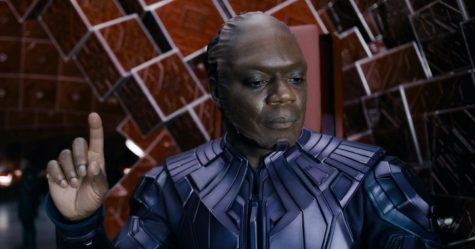
The treatment Rocket endures in these flashbacks is gut-wrenching, elevated by Cooper’s raw and unbridled voice acting. Along with its occasionally gory graphics, the film is easily the MCU’s most mature.
The darkness of the flashback sequences is contrasted by tender moments featuring Rocket’s bond with other animal characters who find friendship in one another despite their torment by the High Evolutionary. Rocket’s origins are finally revealed after years of foreshadowing, and the nuances and depth it gives him make him one of the MCU’s most compelling characters.
The other most crucial character is Peter Quill, also known as Star-Lord (Chris Pratt), who begins the film a depressed alcoholic, grief-stricken over the death of Gamora, another Guardian who died during the events of “Avengers: Infinity War”.
However, a version of Gamora from an alternate timeline who has never met Peter or any of the Guardians was introduced in “Avengers: Endgame”. As a result, Peter is given a more direct conflict between desperately trying to rebuild his and Gamora’s relationship and moving on from his grief.
Though Peter’s arc is interesting, propelled by Pratt’s best performance yet, Gamora herself is sidelined. This remains a persistent issue with her character as she never really got much time to shine outside of “Guardians of the Galaxy Vol.2” and “Avengers: Infinity War”. The choice to kill her character off was not made by Gunn, so integrating her into the story in any adequate way is an accomplishment on its own.
With the exception of Gamora, every other member of the team gets a satisfying amount of focus for their respective arcs.
The narrative as a whole successfully delivers its intended effects, but the plot in and of itself is often clunky and contrived. Characters frequently make unmotivated and abrupt decisions just to get them to where they need to go for the story to continue.
To prevent the film from becoming excessively grim, the movie is littered with scenes of constant quips, banter, and jokes, a trend that was established in the MCU in part by the original “Guardians of the Galaxy”. However, it is not uncommon for the humor to undermine the seriousness of scenes.
Thankfully, the tonal shifts are executed well in this movie. Despite this, not all of the jokes land and it becomes slightly tiring. In spite of this, when the comedy works, it is executed incredibly.
The film’s greatest achievement is creating a satisfying sendoff to some of the most unlikely and influential characters in pop culture, forever changing the biggest franchise in entertainment and emotionally resonating with so many people.
It does so with an unexpected ending given the characters’ previous appearances and the movie’s marketing, yet in hindsight, all of the characters received the most thematically appropriate conclusion possible. The only flaw in the ending’s execution is the minimal foreshadowing of the team’s outcome. It is a brilliant payoff as it is, but it could have worked slightly better if there was more setup.
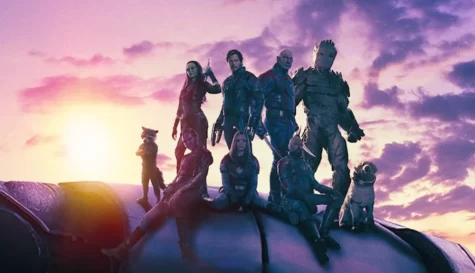
As the conclusion of a self-contained trilogy, the movie does what most trilogy-enders fail to do. It ties three independent installments produced separately into a cohesive ongoing narrative. This is especially difficult because it takes place in the broader context of the MCU, with countless connections and throughlines between drastically different movies in both content and quality.
Nevertheless, “Guardians of the Galaxy Vol.3” opts to focus on crafting a compelling and fitting story both on its own merits and within the Guardians series. Shoehorning tie-ins to the greater MCU was simply not the best creative decision for the story the filmmakers were trying to tell.
Despite the film’s singular, straightforward approach, it distinguishes itself not just within the MCU’s interconnected storyline, but in the real world as well. The creative process is almost entirely detached from Marvel’s recent releases. It has an intangible spark Marvel projects have, for the most part, not had in years. It feels as though it is the creative vision of people who had something meaningful to say, something that cannot be communicated in any other way. It feels designed to create an experience, rather than feeling soulless, corporate, and directed by a committee to maximize monetary gain at the expense of the actual filmmaking or storytelling.
It creates an experience that encourages viewers to accept their own humanity, including their flaws, and to overcome trauma by confronting it rather than running away from it. The bleakness makes the positive elements shine brighter, ultimately making a movie with so much sadness satisfying and victorious. Almost everyone in my screening on opening night left the theater with a smile on their faces and an impact on them. In short, it justifies its own existence in being wildly entertaining and narratively fulfilling.
It tells a well-made and genuinely impactful and meaningful story, which is what the MCU, and Hollywood as a whole, need right now. In part because it is what makes humans, human. Somehow, all of this was illustrated in a movie about an 80’s fanatic, a bunch of aliens, and a talking raccoon. That is something absurd, and also pretty special.

